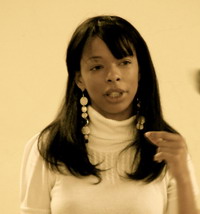Building a Strong and Diverse Community: A Profile of Black Atheists of America

By Ayanna Watson
Black Atheists of America (BAAm) is a non-profit organization dedicated to bridging the gap between atheism and the black community. I founded the organization in 2010 with the intention of diversifying the growing atheist movement and promoting critical thinking.
The black community is the most religious community in America, according to a 2011 Gallup report. BAAm addresses issues that directly affect this community, while providing a support group for black atheists. Religion is so deeply rooted in the black American culture that when a member of the community identifies as an atheist, they are often seen as turning their back on their culture.
There is a lot of misinformation in the black community about American history. The black community attributes many of its accomplishments to religion. Many black Americans believe that the main reason why blacks survived the Jim Crow south, for example, was due to the Black Church. The Black Church was instrumental in facilitating the organization of the black community. It facilitated communication and the pooling of resources, while providing a safe meeting space for members of the black community.
 One should not, however, be quick to equate the necessity of the Black Church as god being a necessity to overcome social injustices. Each of these benefits could have just as easily been achieved without religion. The church took a leadership role in the civil rights movement because its presence and infrastructure was uniquely positioned to do so. The church also promotes anti-intellectualism by requiring its members to dismiss reality and expect supernatural solutions. This line of thinking restricts the ability of the community to study its problems and create real solutions.
One should not, however, be quick to equate the necessity of the Black Church as god being a necessity to overcome social injustices. Each of these benefits could have just as easily been achieved without religion. The church took a leadership role in the civil rights movement because its presence and infrastructure was uniquely positioned to do so. The church also promotes anti-intellectualism by requiring its members to dismiss reality and expect supernatural solutions. This line of thinking restricts the ability of the community to study its problems and create real solutions.
Some black atheists note that such a belief is not only incorrect, but insulting. It is essentially saying that social injustices are not enough for members of the black community to fight for equality, and hence a god is necessary to inform these individuals that inequality should not be accepted.
The belief that god was a necessity in overcoming social injustices also ignores the efforts of non-believers during these movements. For example, no one disputes the fact that A. Philip Randolph was a major contributor to the civil rights movement, but his open lack of belief is often kept silent.
Black communities in America are plagued with poor health care, inadequate education and poverty. In these communities one often finds a large number of churches. In fact, these areas serve as homes to some of the largest megachurches in the country. These entities are not required to pay taxes, in spite of the fact that they reap many benefits from the communities in which they sit. This is detrimental to low-income communities. The amount of money that gets funneled into churches can just as easily be spent on improving issues that leave many black communities in a state of devastation.
BAAm intends to tackle these issues within the black community by improving education. As part of this initiative, BAAm has created two main programs. The Science Cubed program is geared toward providing equal access to education for children despite their socio-economic background. Under Science Cubed, BAAm donates supplies to public school science teachers in low-income areas.
The second program, After-School Cubed, will be geared toward improving critical thinking skills for young age children. The program will serve as an inexpensive alternative after-school program for parents. The children not only receive assistance with their homework, but they are taught how to approach the material using critical thinking skills.
For more information about BAAm and its programs, please visit our website at www.blackatheistsofamerica.org.
Ayanna Watson was born and raised in New York where, as a student at a Christian-based high school, her studies of Christianity ultimately led to her rejection of the Bible. Upon becoming an atheist and recognizing the lack of diversity within the atheist community, she organized Black Atheists of America, Inc. (BAAm).
